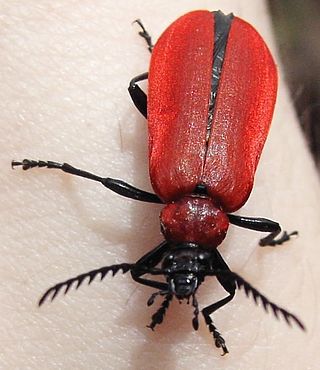
The comb duck or American comb duck, is an unusual duck, found in tropical wetlands in continental South America south to the Paraguay River region in eastern Paraguay, southeastern Brazil and extreme northeastern Argentina, and as a vagrant on Trinidad.

Fire-coloured beetles is the common name for members of the tenebrionoid family Pyrochroidae. The family is found worldwide, and is most diverse at temperate latitudes. Adults measure 2–20 millimetres (0.079–0.787 in); larvae reach 35 millimetres (1.4 in). Larvae of Pyrochroinae are found associated with the bark of dead trees. They are probably mostly fungivorous, although they may become cannibalistic if too crowded.

The Anisopodidae are a small cosmopolitan family of gnat-like flies known as wood gnats or window-gnats, with 154 described extant species in 15 genera, and several described fossil taxa. Some species are saprophagous or fungivorous. They are mostly small to medium-sized flies, except the genera Olbiogaster and Lobogaster, which are large with bizarrely spatulated abdomens. Their phylogenetic placement is controversial. They have been proposed to be the sister group to the higher flies, the Brachycera. Some authors consider this group to be four distinct families – Anisopodidae, Mycetobiidae, Olbiogastridae, and Valeseguyidae.
Parakysis is a genus of catfishes of the family Akysidae. It includes six species.

The Malabar woodshrike is a species of bird usually placed in the family Vangidae. It is found in western India. It is sometimes considered a subspecies of the large woodshrike.
Farfantepenaeus notialis is a species of marine crustacean in the family Penaeidae.

Farfantepenaeus is a genus of prawns in the family Penaeidae. Its eight species were formerly included in the genus Penaeus. It was first published as a genus name in 1972 by Rudolf N. Burukovsky, but without the necessary designation of a type species. That situation was corrected by the same author in 1997. The name Farfantepenaeus commemorates the Cuban carcinologist Isabel Pérez Farfante.
Tylototriton notialis, also known as the Laos knobby newt, southern crocodile newt, or Khammouan crocodile newt, is a species of newt in the family Salamandridae. It is only known from Khammouane province, central Laos. The Vietnamese record has been described as a new species, Tylototriton thaiorum.
The Guinean conger is an eel in the family Congridae. It was described by Robert H. Kanazawa in 1961. It is a tropical, marine eel which is known from Senegal to Angola, in the eastern Atlantic Ocean. It dwells at a depth range of 25–50 metres, and inhabits benthic sand, which it burrows into backwards. Males can reach a maximum total length of 62.7 centimetres.

Solemya is a genus of saltwater clams, marine bivalve mollusks in the family Solemyidae, the awning clams. Solemya is the type genus of the family Solemyidae.

Bombus sylvicola is a species of bumblebee native to North America. It occurs throughout most of Canada, its distribution extending into Alaska and the western contiguous United States. In the southernmost extent of its range in California it occurs only at elevation. It is known commonly as the forest bumblebee.
Caladenia sylvicola, commonly known as forest fingers, is a species of orchid endemic to Tasmania. It has a single erect, sparsely hairy leaf and a single white flower with a greenish back.
Isoentomon sylvicola is a species of proturan in the family Eosentomidae. It is found in South America.

Sylvicola alternatus is a species of wood gnat in the family Anisopodidae. It is found in states between Wisconsin and Maine and between Texas and Georgia.

Sylvicola is a genus of wood gnats in the family Anisopodidae. There are more than 80 described species in Sylvicola.
Hadrokolos is a genus of robber flies in the family Asilidae. There are at least four described species in Hadrokolos.
Sylvicola fuscatus is a species of wood gnats, insects in the family Anisopodidae.
Habronattus notialis is a species of jumping spider in the family Salticidae. It is found in the United States.
Cheirostylis notialis, commonly known as the southern fleshy jewel orchid, is a species of orchid that is endemic to eastern Australia where it grows in shady places in wet forest. It has between three and six egg-shaped leaves and up to four small flowers that open only slowly or not at all. It is differs from C. ovata in having smaller leaves and smaller often cleistogamous flowers.
Brianaria sylvicola is a species of saxicolous lichen in the family Psoraceae. It is also the type species of genus Brianaria.









